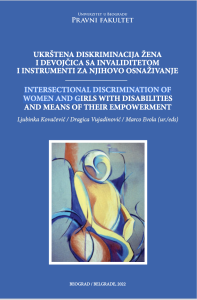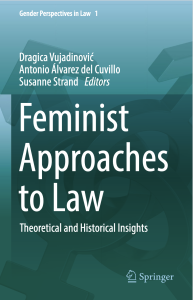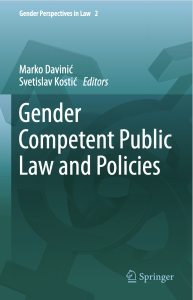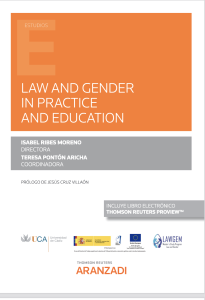Project’s Research results

Project’s Research results
 Intersectional Discrimination of Women and Girls with Disabilities and Means of their Empowerment
Intersectional Discrimination of Women and Girls with Disabilities and Means of their Empowerment
Intersectional Discrimination of Women and Girls with Disabilities and Means of their Empowerment
 LAWGEM leads to the publication of the textbook Gender-Competent Legal Education and the first book in the Gender Perspectives in Law edition
LAWGEM leads to the publication of the textbook Gender-Competent Legal Education and the first book in the Gender Perspectives in Law edition
University of Belgrade Faculty of Law is glad to inform you that the New Quality in Education for Gender Equality – Strategic Partnership for the Development of Master’s Study Program LAW AND GENDER, LAWGEM has led to the development and publication of books of great importance not only for teaching staff, but also for legal practitioners, students, as well as anyone else interested in acquiring a better understanding of contemporary gender competent legal questions.
This primarily relates to the textbook Dragica Vujadinovic, Mareike Fröhlich, Thomas Giegerich (eds.), Gender-Competent Legal Education. You can access the textbook by clicking this link.
The textbook presents a result of joint work of authors from five European universities – Libera Universita Maria SS. Assunta Di Roma, Department of Law – LUMSA University (Italy), Universidad de Cadiz (Spain), Orebro University, School of Law, Psychology and Social Work (Sweden), Saarlandes, Faculty of Law Europa-Institut (Germany), and Belgrade University (Serbia) which also acted as coordinator. It is safe to say that this textbook presents an important step towards achieving a better understanding of law in a systemic and gender-competent way. One of the main intellectual outputs of the LAWGEM project is the publication of this textbook, which reflects all relevant fields of legal education of the curriculum for the master’s study program “Law and Gender”. Academic scholars from universities across five different countries were involved in writing this book. Such successful teamwork gives the text a specific quality and is an unprecedented academic phenomenon. Working at different universities (primarily at faculties of law), researchers accepted to investigate and study feminist critical legal and political literature, reconsidering from a gender perspective their various fields of academic research and teaching. All chapters of the book present an in-depth attempt to deconstruct and reconstruct specific relevant fields of legal education from a gender perspective. To that end the chapters articulate scientific analyses of all legal fields of knowledge related to the positive civil, public, international, criminal law, European Union Law, as well as to the legal-economic, legal-historical, theoretical-legal fields of legal education. Sometimes the notion of “woman” still features as the paradigmatic subject, rather than the notion of “gender;” other times, the notion of “gender” is considered mostly in a binary way and primarily in a heteronormative sense. This is problematic when faced with the diversity of lives women lead and considering the changing notions of “man” and masculinity, as well as that of “gender,” and indeed, when witnessing the impact changes to family law, inheritance law, criminal law, tax law etc., have had on the heteronormative order. Some authors and chapters have kept the binary gender construction, others have moved towards conceiving issues surrounding the identities of a third gender and transgender persons. These differences in levels of understandings reflect the different stages and states of affairs in knowledge and mindsets of the authors involved, thus also generally reflecting existing differences in that regard among the contemporary intellectual, political, and legal public. It could be said that the scope of these texts surpasses their inner quality; indeed, they do because they seek to stimulate and provoke further academic attempts at ever better and richer results of systemic gender-competent legal knowledge. Last but not least it is important to emphasize that this textbook encompasses 18 different chapters dealing with specific disciplines of law and similar multidisciplinary fields. This textbook will certainly stimulate its users, but also the broader legal public to continue reconsidering the law and specific fields of interest within it from a gender perspective.
Moreover, it is our great pleasure to inform you about the book series Gender Perspectives in Law, 2022 eds. D. Vujadinović, I. Krstić. The book series represents the added value to the project Erasmus+ Strategic Partnership in Higher Education, called “New Quality in Education for Gender Equality – Strategic Partnership for the Development of Master’s Study Program LAW AND GENDER, LAWGEM.” It deals with the contemporary gender competent legal questions which are aimed to allow for a better understanding and establishing a gender equality approach to different fields of law. In that respect, the editors of the book series underline that a gender-competent approach is required when considering the highest values and normative standards of modern international, European, and national law. The authors in the series volumes try to establish a gender equality approach to different fields of law while taking into consideration specific issues of their interest and attempting to consider chosen different aspects of legal knowledge and practice in a paradigmatic gender-competent manner. They attempt to critically reconsider the dominant molds of legal knowledge and present innovative gender-sensitive and gender-competent insights relating to different issues within all fields of law, in order to introduce new research topics relevant for gender equality in law, as well as to stimulate the development of a legal and institutional framework for achieving gender equality in real life. The book series Gender Perspectives in Law encouraged scholars and experts from different fields of law and humanities-social sciences to reconstruct their legal and multidisciplinary knowledge from the standpoint of gender equality.
This book series encompasses four books:
- Dragica Vujadinović, Antonio Alvarez de Cuvillo, Susanne Strand (eds.) Feminist Approaches to Law – Theoretical and Historical Insights;
- Marko Davinić and Svetislav Kostić (eds). Gender-Competent Public Law and Policies;
- Ivana Krstić, Marco Evola, Maria Isabel Ribes Moreno (eds.), Legal Issues of International Law from a Gender Perspective;
- Gabriele Carapezza Figlia, Ljubinka Kovačević, Eleonor Kristoffersson (eds.), Gender Perspectives in Private Law.
The first book published within the series – Dragica Vujadinović, Antonio Alvarez de Cuvillo, Susanne Strand (eds.) Feminist Approaches to Law – Theoretical and Historical Insights, offers the background theoretical and historical analysis for the book series Gender Perspectives in Law. The book contains papers witnessing different impacts of feminist political and legal theories, as well as critical legal studies. The ongoing issue of defining gender, for example, is a recurring theme in the texts. There are papers that question the binary basis of the gender issue and the notion of gender as such. Others start from the binary dichotomy and attempt to expand the consideration toward a multi-dimensional understanding of gender identities. The main focus is feminist reconsideration of all relevant fields of legal knowledge. The primary aim is to demystify the seemingly neutral character of legal norms and legal knowledge and highlight the power relations at different layers, beginning with male and female legal subjects of Western heredity (in terms of culture, ethnicity, and race), then moving on to different needs and power relations among female persons of different races and classes, and finally moving on to differentiating gender relations and identities beyond the framework of the women–men binary dichotomous codification, i.e. also taking into consideration the multiple options of intersex, transgender, queering, etc.
The papers deal with very different topics related to feminist political theories, the feminist movement, critical race theory, critical legal history, queer theories, adultery, as well as issues related to constitutional democracy and theories of democracy in general. The converging aim and axis is gender equality-its clarification, articulation, promotion in legal theory and practice. Interesting and indicative enough is the fact that there are authors from many countries spanning across different continents. The global relevance of the gender equality perspective in legal education, legislation, and legal professions has been expressed and confirmed in the content and authorship of this book.
 LAWGEM leads to the publication of the second book in the Gender Perspectives in Law edition – Gender Competent Public Law and Policies
LAWGEM leads to the publication of the second book in the Gender Perspectives in Law edition – Gender Competent Public Law and Policies
University of Belgrade Faculty of Law is glad to inform you that the New Quality in Education for Gender Equality – Strategic Partnership for the Development of Master’s Study Program LAW AND GENDER, LAWGEM has led to the development and publication of a book series of great importance not only for teaching staff, but also for legal practitioners, students, as well as anyone else interested in acquiring a better understanding of contemporary gender competent legal questions. The previously mentioned relates to the Springer book series Gender Perspectives in Law, 2022 eds. D. Vujadinović, I. Krstić. The book series represents the added value to the project Erasmus+ Strategic Partnership in Higher Education, called “New Quality in Education for Gender Equality – Strategic Partnership for the Development of Master’s Study Program LAW AND GENDER, LAWGEM.”
This book series encompasses four books:
- Dragica Vujadinović, Antonio Alvarez de Cuvillo, Susanne Strand (eds.) Feminist Approaches to Law – Theoretical and Historical Insights;
- Marko Davinić and Svetislav Kostić (eds). Gender Competent Public Law and Policies;
- Ivana Krstić, Marco Evola, Maria Isabel Ribes Moreno (eds.), Legal Issues of International Law from a Gender Perspective;
- Gabriele Carapezza Figlia, Ljubinka Kovačević, Eleonor Kristoffersson (eds.), Gender Perspectives in Private Law.
The second book published within the series Marko Davinić, Svetislav Kostić (eds.) Gender Competent Public Law and Policies offers a gender competent and gender sensitive perspective on public law and public policies. The collection of papers begins with a very sophisticated discussion on gender perspectives in constitutional law. The book also covers an analysis of the role of the European Ombudsman in the area of gender discrimination. Particular attention is given to the importance of mainstreaming gender into public policies. Thus, the legal and institutional frameworks of Spain and Serbia are presented, which can be an inspiration to some other countries. Another important aspect covered in the book is an analysis of systemic differences (gender pay gap) between average wages of women and men in the six Western Balkans countries. The book offers a discussion on female genital mutilation as a highly gendered crime based on extreme versions of the rigid patriarchal ethnic and religious norms and customs. It is analyzed through the lenses of the Istanbul Convention, as a tool to tackle violence against women. Particular attention is given to the femicide, its definitions, forms, and phenomenological characteristics. Femicide has been acknowledged recently and is still facing inadequate judicial response in many countries. A special focus is given to German and Serbian experiences in acknowledging femicide and combating it through different measures. Finally, the importance of stalking laws has been presented, as stalking is a highly gendered crime and many states fail to combat it adequately. The collection of essays offered in this book will be of interest to all those working in the field of public law, and policymakers, as well as to students and academics who can broaden and deepen their research on different legal issues of public law and policies from gender perspectives. The converging aim and axis is gender equality—its clarification, articulation, and promotion within public law theory and practice. The global relevance of the gender equality perspective in legal education, legislation, and legal professions has been expressed and confirmed in the content and authorship of this book. This book includes papers written by Susanne Baer, Marko Davinić, Branko Radulović and Vanesa Hervías-Parejo, Nikola Ilić, Ivana Marković, Aleida Luján Pinelo, Kosana Beker and Vida Vilić, and Susanne Strand and Ramunė Jakštienė.
 Book “Law and gender in education and practice”, Isabel Ribes Moreno (directora) y Teresa Pontón Aricha (coordinadora), Thompson Reuters / Aranzadi, Cizur Menor (Navarra), 2022.
Book “Law and gender in education and practice”, Isabel Ribes Moreno (directora) y Teresa Pontón Aricha (coordinadora), Thompson Reuters / Aranzadi, Cizur Menor (Navarra), 2022.
The edited volume “Law and gender in education and practice” is an additional result to LAWGEM Project, since it contains papers presented at the international congress that University of Cadiz organized from 19th to 20th July 2021, to address the impact of gender in education and professional practice. The editor of the book is Prof. Dr. Isabel Ribes Moreno, Coordinator of the LAWGEM Project in the University of Cádiz, while coordinator is Dr. Teresa Pontón Aricha from the University of Cadiz.
After a foreword in Spanish and English written by Dr. Jesús Cruz Villalón, Full Professor of Labour and Social Security Law at the University of Seville, the content of the book is comprised of two parts. Part I is dealing with the importance of gender in professional activity. This first part begins with the literal transcription of the lecturer given at the congress by the Advocate General at the Court of Justice of the European Union, Dr. J. Kokkot, entitled “Impact of Gender Perspective on Legal Profession: useful or harmful”. The following papers are based on a comprehensive review on the impact of gender on Labour and Social Security Law, firstly by Dr. Lj. Kovačević, Associate Professor at the Faculty of Law, University of Belgrade, addressed “Access to employment and genderbased discrimination”. Secondly, Dr. T. Kahale Carrillo, Professor at the Polytechnic University of Cartagena, tackled on “Discrimination against women in the implementation of artificial intelligence systems and algorithms”. Thirdly, the PhD student at the Faculty of Law of the University of Belgrade Ms. M. Kuzminac approached “The relation between family duties and gender pay gap as manifestation of gender inequality in the European Union. Afterwards, Dr. M.T. Alameda Castillo and Dr. D. Pérez del Prado, associate professors at Carlos III University presented the study on “Talking about Gender and Remuneration in Higher Education in Spain”. This part is reinforced with two contributions on ILO Convention 190 on violence and harassment at work, by Dr. F. Fuentes Rodríguez, Associate Professor, Department of Labour Law and Social Security, University of Cádiz, analyzing “Gender-based cyberviolence at work”, on the other hand, the Master’s Student at the Department of Labour and Social Security Law, University of Sao Paulo Faculty of Law, Ms. C. Valadares Chaves presented a paper on “Harassment and Gender: an analysis of ILO Convention no. 190 during the Covid-19 crisis”. Within this first part, other disciplines offer their perspective about Law and gender. Thus, Dr. A.I. Berrocal Lanzarot, Professor at the Complutense University of Madrid, deals with “The comprehensive protection of minors in front of violence. Present and future in Spain”. Closing the section, several Master’s and PhD students submitted papers: Ms. L.A. Schmitz, PhD candidate, Criminal Law, Criminal Procedure, Philosophy of Law
and Comparative Law at the University of Cologne, presented the chapter on “The role of gender for the legitimisation of behavioral and sanctioning norms”, next Ms. A. Pavlović, PhD student, aculty of Law, University of Belgrade, dealt with “Gender equality and women with disabilities”. Finally, Ms. M. Hernández Romero, student in the master’s in international Relations and Migrations (University of Cádiz) provided a written study about “Gender coloniality: a study of the role of Sahrawi women in the struggle for selfdetermination”.
The second part of the book is devoted to the role of education in raising awareness of gender equality. The first contribution consists of a literal transcription of the lecturer given at the congress by the Full Professor at the University of Berkeley, Dr. D. B. Oppenheimer on “Leveraging technology to teach gender equality law”. Two papers were presented in this axe: the first on “The gender perspective and the cooperative teaching-learning method in the study of Labour Law, by Dr. R. Poquet Catalá, Lecturer at the University of Valencia, and the second, by Dr. G. González Agudelo, Professor at the Universidad de Cádiz, which deals with “Gender and criminality, how are intersectionality and the decolonial turn incorporated into social studies?”.
The institutions that financially contributed to this publication are: the University of Cadiz, through the Faculty of Labour Sciences, the Faculty of Law and the Rector’s Delegate to the Equality and Inclusion Policy, and the collaboration of the project “RTI2018-097917-B-100. Retos del Derecho del Trabajo español ante la doctrina del Tribunal de Justicia en materia de política social y derechos fundamentales”.
Consortium partners
 |
 |
 |
 |
 |
 |


